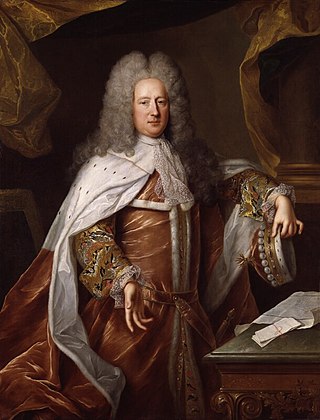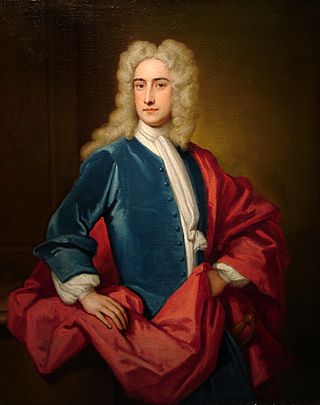The Whigs were a political party in the Parliaments of England, Scotland, Ireland, Great Britain and the United Kingdom. Between the 1680s and the 1850s, the Whigs contested power with their rivals, the Tories. The Whigs became the Liberal Party when it merged with the Peelites and Radicals in the 1850s. Many Whigs left the Liberal Party in 1886 over the issue of Irish Home Rule to form the Liberal Unionist Party, which merged into the Conservative Party in 1912.

Robert Walpole, 1st Earl of Orford,, known between 1725 and 1742 as Sir Robert Walpole, was a British Whig politician who served as Prime Minister of Great Britain from 1721 to 1742. He also served as First Lord of the Treasury, Chancellor of the Exchequer, and Leader of the House of Commons, and is generally regarded as the de facto first prime minister of Great Britain.

The President, Directors and Company of the Bank of the United States, commonly known as the First Bank of the United States, was a national bank, chartered for a term of twenty years, by the United States Congress on February 25, 1791. It followed the Bank of North America, the nation's first de facto national bank. However, neither served the functions of a modern central bank: They did not set monetary policy, regulate private banks, hold their excess reserves, or act as a lender of last resort. They were national insofar as they were allowed to have branches in multiple states and lend money to the US government. Other banks in the US were each chartered by, and only allowed to have branches in, a single state.

The Whiskey Rebellion was a violent tax protest in the United States beginning in 1791 and ending in 1794 during the presidency of George Washington. The so-called "whiskey tax" was the first tax imposed on a domestic product by the newly formed federal government. Beer was difficult to transport and spoiled more easily than rum and whiskey. Rum distillation in the United States had been disrupted during the American Revolutionary War, and whiskey distribution and consumption increased afterwards. The "whiskey tax" became law in 1791, and was intended to generate revenue to pay the war debt incurred during the Revolutionary War. The tax applied to all distilled spirits, but consumption of American whiskey was rapidly expanding in the late 18th century, so the excise became widely known as a "whiskey tax". Farmers of the western frontier were accustomed to distilling their surplus rye, barley, wheat, corn, or fermented grain mixtures to make whiskey. These farmers resisted the tax. In these regions, whiskey often served as a medium of exchange. Many of the resisters were war veterans who believed that they were fighting for the principles of the American Revolution, in particular against taxation without local representation, while the federal government maintained that the taxes were the legal expression of Congressional taxation powers.

The Kingdom of Great Britain was a sovereign state in Western Europe from 1707 to the end of 1800. The state was created by the 1706 Treaty of Union and ratified by the Acts of Union 1707, which united the kingdoms of England and Scotland to form a single kingdom encompassing the whole island of Great Britain and its outlying islands, with the exception of the Isle of Man and the Channel Islands. The unitary state was governed by a single parliament at the Palace of Westminster, but distinct legal systems—English law and Scots law—remained in use.

John Russell, 1st Earl Russell,, known by his courtesy title Lord John Russell before 1861, was a British Whig and Liberal statesman who was Prime Minister of the United Kingdom from 1846 to 1852 and again from 1865 to 1866.

Henry St John, 1st Viscount Bolingbroke was an English politician, government official and political philosopher. He was a leader of the Tories, and supported the Church of England politically despite his antireligious views and opposition to theology. He supported the Jacobite rebellion of 1715 which sought to overthrow the new king George I. Escaping to France he became foreign minister for James Francis Edward Stuart. He was attainted for treason, but reversed course and was allowed to return to England in 1723. According to Ruth Mack, "Bolingbroke is best known for his party politics, including the ideological history he disseminated in The Craftsman (1726–1735) by adopting the formerly Whig theory of the Ancient Constitution and giving it new life as an anti-Walpole Tory principle."

William Pulteney, 1st Earl of Bath, was an English Whig politician and peer who sat in the British House of Commons from 1707 to 1742 when he was raised to the peerage as the Earl of Bath by George II of Great Britain. He is sometimes represented as having served as First Lord of the Treasury and Prime Minister of Great Britain as part of the short-lived ministry in 1746, although most modern sources do not consider him to have held the office.

Spencer Compton, 1st Earl of Wilmington, was a British Whig statesman who served continuously in government from 1715 until his death in 1743. He sat in the English and British House of Commons between 1698 and 1728, and was then raised to the peerage and sat in the House of Lords. He served as the prime minister of Great Britain from 1742 until his death in 1743. He is considered to have been Britain's second prime minister, after Robert Walpole, but worked closely with the Secretary of State, Lord Carteret, in order to secure the support of the various factions making up the government.
The Tories were a loosely organised political faction and later a political party, in the Parliaments of England, Scotland, Ireland, Great Britain and the United Kingdom. They first emerged during the 1679 Exclusion Crisis, when they opposed Whig efforts to exclude James, Duke of York from the succession on the grounds of his Catholicism. Despite their fervent opposition to state-sponsored Catholicism, Tories opposed his exclusion because of their belief that inheritance based on birth was the foundation of a stable society.
William Talbot, 1st Earl Talbot, PC, styled as Lord Talbot from 1737 to 1761, was an English peer and Whig politician. Talbot was a notable figure among opposition Whig politicians during the reign of King George II before later coming to Court during the reign of his grandson, taking the office of Lord Steward of the Household.

Charles Davenant was an English economist, Tory politician and pamphleteer who sat in the Parliament of England representing the parliamentary constituencies of St Ives and Great Bedwyn.

Samuel Sandys, 1st Baron Sandys, was a British Whig politician who represented Worcester in the House of Commons from 1718 until 1743, when he was created Baron Sandys. He held numerous posts in the government of the United Kingdom, namely Chancellor of the Exchequer, Leader of the House of Commons, Cofferer of the Household and First Lord of Trade. He was also a justice in eyre.
Robert Dundas of Arniston, the elder, 2nd Lord Arniston (1685–1753) was a Scottish lawyer, and Tory politician who sat in the House of Commons from 1722 to 1737. In 1728 he reintroduced into Scottish juries the possible verdicts of guilty or not guilty as against proven or not proven. He was Lord President of the Court of Session from 1748 to 1753.
Jonathan Charles Douglas Clark is a British historian of both British and American history. He received his undergraduate degree at Downing College, Cambridge. Having previously held posts at Peterhouse, Cambridge and All Souls College, Oxford into 1996, he has since held the Joyce C. and Elizabeth Ann Hall Distinguished Professorship of British History at the University of Kansas.

The Cobhamite faction were an 18th-century British political faction built around Richard Temple, 1st Viscount Cobham and his supporters. Among its members, the group included the future Prime Ministers William Pitt and George Grenville. They had a general Whig philosophy and were at first supporters of Prime Minister Sir Robert Walpole but later became opponents of his administration.
Country Party was the name employed in the Kingdom of England by political movements which campaigned in opposition to the Court Party.
Henry Cunningham, of Boquhan, Gorgunnock, Stirling, was a Scottish Whig politician who sat in the House of Commons from 1709 to 1734. He was given the post of Governor of Jamaica, but died two months after landing there. A description of Cunningham appears in the introduction to Scott's historical novel ‘’Rob Roy’’.

The Whig Split occurred between 1717 and 1720, when the governing British Whig Party divided into two factions: one in government, led by James Stanhope; the other in opposition, dominated by Robert Walpole. It coincided with a dispute between George I and his son George, Prince of Wales, with the latter siding with the opposition Whigs. It is also known as the Whig Schism. After three years it was resolved by a reconciliation between the two factions. Walpole went on to serve as Prime Minister from 1721 to 1742.

The Peerage Bill was a 1719 measure proposed by the British Whig government led by James Stanhope, 1st Earl Stanhope, and Charles Spencer, 3rd Earl of Sunderland, which would have largely halted the creation of new peerages, limiting membership of the House of Lords.














